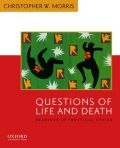
Featuring sixty-seven classic and contemporary selections, Questions of Lifeand Death: Readings in Practical Ethics is ideal for courses in contemporary moral problems, applied ethics, and introduction to ethics. In contrast with other moral problems anthologies, it deals exclusively with current moral issues concerning life and death, the ethics of killing, and the ethics of saving lives. By focusing on these specific questions--rather than on an unrelated profusion ofmoral problems--this volume offers a theoretically unified presentation that enables students to see how their conclusions regarding one moral issue can affect their positions on other debates. Featuring sixty-seven classic and contemporary selections, Questions of Life and Death: Readings in Practical Ethics is ideal for courses in contemporary moral problems, applied ethics, and introduction to ethics. In contrast with other moral problems anthologies, it dealsexclusively with current moral issues concerning life and death, the ethics of killing, and the ethics of saving lives. By focusing on these specific questions--rather than on an unrelated profusion ofmoral problems--this volume offers a theoretically unified presentation that enables students to see how their conclusions regarding one moral issue can affect their positions on other debates. Questions of Life and Death includes readings on socially and politically relevant controversies including famine, killing in war, terrorism, capital punishment, killing animals, suicide, euthanasia, and abortion. The essays includeclassic works by Thomas Aquinas, Thomas Hobbes, Immanuel Kant, and John Lockealongside contemporary selections by Thomas Nagel, James Rachels, Peter Singer, Judith Jarvis Thomson, Michael Walzer, and many others. Rather than presenting students withreadings on abstract and complex moral theories, editor Christopher Morris has chosen works that reflect "middle-level moral theory" and inspire everyday questions like "What if everyone did that?" Each reading is preceded by a briefintroduction and followed by discussion questions. For additional theoreticalbackground, students can consult the final chapter, a "Moral Theory Primer" (by Mark Timmons), which clearly outlines various theories. INDICE: I. WHY IS KILLING USUALLY WRONG? 1. R. M. Hare, "What Is Life?" 2.Thomas Aquinas, "Of Murder" 3. John Locke, "The Natural State of Men" 4. JohnPaul II, "Thou Shall Not Kill" 5. Thomas Hobbes, "The Value of a Man Is His Price" 6. Jeff McMahan, "Killing" 7. Jonathan Glover, "Not Playing God" II. WHYIS DEATH AN EVIL? 8. James Rachels, "Death and Evil" 9. Thomas Nagel, "Death"10. Robert Nozick, "Death" III. WHAT MAKES OUR LIVES GO WELL? 11. Thomas Aquinas, "Happiness" 12. Thomas Hobbes, "Felicity" 13. Robert Nozick, "The Experience Machine" 14. Martha Nussbaum, "A Conception of the Human Being: The Central Human Capabilities" 15. Derek Parfit, "What Makes Someone's Life Go Best?" 16. Thomas Nagel, "The Meaning of Life" IV. SAVING LIVES: FAMINE 17. Peter Singer, "Famine, Affluence, and Morality" 18. David Schmidtz, "Islands in a Sea ofObligation: Limits of the Duty to Rescue" V. KILLING IN WAR 19. Christopher W. Morris, "Notes on War and Peace" 20. Thomas Hobbes, "War of Every One against Every One" 21. Thomas Aquinas, "Of War" 22. Harry Truman, "Address to the American People, 9 August 1945" 23. John Rawls, "Fifty Years after Hiroshima" 24. Thomas Nagel, "War and Massacre" 25. Michael Walzer, "Supreme Emergency" 26.George Orwell, "On the Futility of Limiting War" 27. George I. Mavrodes, "Conventions and the Morality of War" 28. Jeff McMahan, "The Ethics of Killing in War" VI. TERRORISM 29. R. G. Frey and Christopher W. Morris, "Violence, Terrorism, and Justice" 30. Loren Lomasky, "The Political Significance of Terrorism"31. Douglas Lackey, "The Evolution of the Modern Terrorist State: Area Bombing and Nuclear Deterrence" 32. Robert K. Fullinwider, "Terrorism, Innocence, and War" VII. CAPITAL PUNISHMENT 33. Thomas Aquinas, "Whether it is Lawful to Kill Sinners" 34. Immanuel Kant, "The Right of Punishing" 35. John Paul II, "TheDeath Penalty" 36. Amnesty International, "The Death Penalty and the Right toLife" 37. Hugo Adam Bedau, "The Case against the Death Penalty" 38. Louis P. Pojman, "Why the Death Penalty Is Morally Permissible" 39. Christopher W. Morris, "Punishment and Loss of Moral Standing" VIII. ANIMALS 40. Thomas Aquinas, "The Status of Animals" 41. Immanuel Kant, "Duties to Animals and Spirits" 42.Peter Singer, "All Animals are Equal" 43. Peter Carruthers, "Against the Moral Standing of Animals" 44. Alastair Norcross, "Puppies, Pigs, and People: Eating Meat and Marginal Cases" IX. SUICIDE 45. Seneca, "On the Proper Time to Slip the Cable" 46. Thomas Aquinas, "Whether it is Lawful to Kill Oneself" 47. David Hume, "Of Suicide" X. EUTHANASIA 48. John Paul II, "The Tragedy of Euthanasia" 49. James Rachels, "Active and Passive Euthanasia" 50. F. M. Kamm, "A Right to Choose Death? A Moral Argument for the Permissibility of Euthanasia and Physician-assisted Suicide" 51. David Velleman, "Against the Right to Die" 52.Allen Buchanan, "Intending Death: The Structure of the Problem and Proposed Solutions" XI. When Do We Die? 53. President's Commission, "Defining Death" 54.David DeGrazia, "Biology, Consciousness, and the Definition of Death" 55. Jeff McMahan, "When Do We Die, or Cease to Exist?" XII. ABORTION 56. John Paul II, "The Unspeakable Crime of Abortion" 57. Judith Jarvis Thomson, "A Defense ofAbortion" 58. Mary Ann Warren, "On the Moral and Legal Status of Abortion" (and "Postscript on Infanticide," 1982) 59. Donald Marquis, "Why Abortion Is Immoral" 60. Jeff McMahan, "Beginnings" 61. Eugene Mills, "The Egg and I: Conception, Identity, and Abortion" 62. Paul Gomberg, "Abortion and the Morality of Nurturance" XIII. MAKING PEOPLE: GENETIC ENGINEERING, CLONING 63. Leon Kass, "Preventing a Brave New World" 64. Robert George and Alfonso Gmez-Lobo, "Human Cloning and Human Dignity" 65. Michael Tooley, "The Moral Status of Cloning" XIV. FUTURE GENERATIONS 66. Gregory S. Kavka, "The Paradox of Future Individuals" XV. MORAL THEORIES 67. Mark Timmons, "A Moral Theory Primer"
- ISBN: 978-0-19-515698-0
- Editorial: Oxford University
- Encuadernacion: Rústica
- Páginas: 560
- Fecha Publicación: 20/10/2011
- Nº Volúmenes: 1
- Idioma: Inglés
